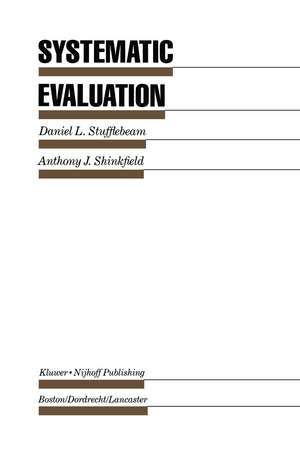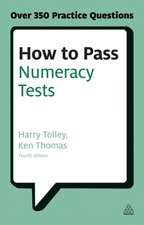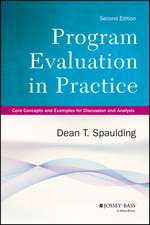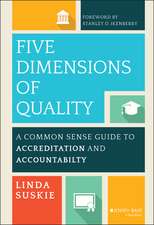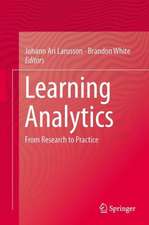Systematic Evaluation: A Self-Instructional Guide to Theory and Practice: Evaluation in Education and Human Services, cartea 8
Autor D.L. Stufflebeam, Anthony J. Shinkfielden Limba Engleză Paperback – 18 noi 2011
Din seria Evaluation in Education and Human Services
- 18%
 Preț: 952.57 lei
Preț: 952.57 lei - 20%
 Preț: 335.52 lei
Preț: 335.52 lei -
 Preț: 387.96 lei
Preț: 387.96 lei - 15%
 Preț: 641.71 lei
Preț: 641.71 lei - 15%
 Preț: 707.63 lei
Preț: 707.63 lei -
 Preț: 388.52 lei
Preț: 388.52 lei -
 Preț: 384.86 lei
Preț: 384.86 lei - 15%
 Preț: 648.56 lei
Preț: 648.56 lei -
 Preț: 382.95 lei
Preț: 382.95 lei - 15%
 Preț: 645.60 lei
Preț: 645.60 lei -
 Preț: 387.96 lei
Preț: 387.96 lei -
 Preț: 397.16 lei
Preț: 397.16 lei -
 Preț: 387.75 lei
Preț: 387.75 lei -
 Preț: 388.52 lei
Preț: 388.52 lei -
 Preț: 389.88 lei
Preț: 389.88 lei - 15%
 Preț: 643.34 lei
Preț: 643.34 lei -
 Preț: 383.33 lei
Preț: 383.33 lei - 15%
 Preț: 584.76 lei
Preț: 584.76 lei - 15%
 Preț: 648.24 lei
Preț: 648.24 lei - 18%
 Preț: 1224.68 lei
Preț: 1224.68 lei - 18%
 Preț: 958.38 lei
Preț: 958.38 lei -
 Preț: 392.21 lei
Preț: 392.21 lei - 15%
 Preț: 644.30 lei
Preț: 644.30 lei - 15%
 Preț: 646.43 lei
Preț: 646.43 lei - 18%
 Preț: 1231.64 lei
Preț: 1231.64 lei -
 Preț: 388.72 lei
Preț: 388.72 lei - 18%
 Preț: 1227.04 lei
Preț: 1227.04 lei - 15%
 Preț: 646.43 lei
Preț: 646.43 lei -
 Preț: 394.12 lei
Preț: 394.12 lei - 15%
 Preț: 644.95 lei
Preț: 644.95 lei - 15%
 Preț: 650.19 lei
Preț: 650.19 lei -
 Preț: 390.25 lei
Preț: 390.25 lei
Preț: 391.22 lei
Nou
Puncte Express: 587
Preț estimativ în valută:
74.86€ • 78.16$ • 61.96£
74.86€ • 78.16$ • 61.96£
Carte tipărită la comandă
Livrare economică 04-18 aprilie
Preluare comenzi: 021 569.72.76
Specificații
ISBN-13: 9789401089951
ISBN-10: 9401089957
Pagini: 364
Ilustrații: 368 p.
Dimensiuni: 152 x 229 x 19 mm
Greutate: 0.49 kg
Ediția:1985
Editura: SPRINGER NETHERLANDS
Colecția Springer
Seria Evaluation in Education and Human Services
Locul publicării:Dordrecht, Netherlands
ISBN-10: 9401089957
Pagini: 364
Ilustrații: 368 p.
Dimensiuni: 152 x 229 x 19 mm
Greutate: 0.49 kg
Ediția:1985
Editura: SPRINGER NETHERLANDS
Colecția Springer
Seria Evaluation in Education and Human Services
Locul publicării:Dordrecht, Netherlands
Public țintă
ResearchCuprins
1 Introduction to Evaluation.- Objectives.- What Is Evaluation?.- Methods.- Standards.- History.- Roles in Evaluation Work.- Knowledge Test for Unit 1.- Application Exercise.- Questions Without Answers.- References.- 2 An Analysis of Alternative Approaches to Evaluation.- Objectives.- Alternative Conceptualizations of Evaluation.- Pseudoevaluation.- Quasievaluations.- True Evaluations.- Conclusion.- Knowledge Test for Unit 2.- Application Exercises.- Questions Without Answers.- References.- 3 Objectives-oriented Evaluation: The Tylerian Tradition.- Objectives.- The Intention of the Tylerian Approach.- Some Limitations of the Tylerian Approach.- Metfessel and Michael: An Extension of the Tylerian Approach.- Knowledge Test for Unit 2.- Application Exercises.- Questions Without Answers.- References.- 4 Edward A. Suchman and the Scientific Approach to Evaluation.- Objectives.- Conceptual Aspects of Evaluation.- Methodological Aspects of Evaluation.- Evaluation and Program Administration.- Knowledge Test for Unit 4.- Questions Without Answers.- References.- 5 Cronbach’s Designing Evaluations: A Synopsis.- Objectives.- to the Issues.- Cronbach’s Concepts of the Elements in an Evaluation Design: Uto.- Planning for Communication.- The Promise of Evaluation.- Knowledge Test for Unit 5.- Application Exercises.- Questions Without Answers.- References.- 6 Stufflebeam’s Improvement-oriented Evaluation.- Objectives.- Some Personal History.- Development of the CIPP Model.- The PDK Study Committee’s Elaboration of CIPP Evaluation.- CIPP Compared to Other Recent Evaluation Proposals.- CIPP as a Strategy for Improving Systems.- An Overview of CIPP Categories.- Designing Evaluations.- Metaevaluation and Standards.- Conclusion.- Knowledge Test for Unit 6.- Application Exercises.-Questions Without Answers.- References.- 7 Stake’s Client-centered Approach to Evaluation.- Objectives.- The Countenance Statement of Evaluation.- Format for Data Collection.- Responsive Evaluation.- General Observations.- Knowledge Test for Unit 7.- Application Exercises.- Questions Without Answers.- References.- 8 T.R. Owens, R.L. Wolf: An Adversary Approach to Evaluation.- Objectives.- Intention of the Adversary Model.- One Form of the Adversary Approach: Wolf’s Judicial Model.- Pros and Cons of Adversary Evaluation.- Knowledge Test for Unit 8.- Application Exercises.- Questions Without Answers.- References.- 9 Illuminative Evaluation: The Holistic Approach.- Objectives.- Traditional Evaluation: Seeds of Doubt.- Stake’s Concept of Evaluation as Portrayal.- Illuminative Evaluation: A Social-Anthropological Paradigm.- The Context of Educational Programs.- Organization and Methods of Illuminative Evaluation.- Reporting and Decision Making.- Problems Associated with Illuminative Evaluation.- Knowledge Test for Unit 9.- Application Exercises.- Questions Without Answers.- References.- 10 Michael Scrlven’s Consumer-Oriented Approach to Evaluation.- Objectives.- Evaluation Defined.- Critique of Other Persuasions.- Formative and Summative Evaluation.- Amateur versus Professional Evaluation.- Intrinsic and Payoff Evaluation.- Goal-free Evaluation.- Needs Assessment.- The Key Evaluation Checklist.- Metaevaluation.- Evaluation Ideologies.- Professionalization of Evaluation.- Knowledge Test for Unit 10.- Application Exercises.- Questions Without Answers.- References.- Indexes.
